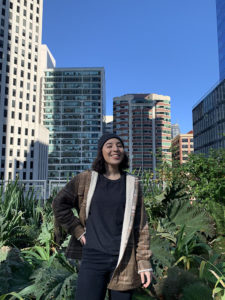Meet the New AHA Intern: Kamilah Arteaga

Please welcome the new social justice programming intern, Kamilah Arteaga!
TheHumanist.com: What is your educational and work background?
I am currently a junior at Stanford University majoring in comparative studies in race and ethnicity with a subplan in politics, policy, and equity. Prior to this internship I was an undergraduate research assistant at the Stanford Graduate School of Education, conducting research about the experiences of English Second Language students at local high schools in the Bay Area.
TheHumanist.com: How did you first learn about humanism?
I think I first heard about humanism in a history class in high school. I remember thinking to myself that it was such an obvious state of mind—of course you can be a good person without religion, through logic and reason and a moral compass. I realize this isn’t the only thing humanism is, but it was interesting to learn something that seemed obvious to me was something people identify as. However, the majority of my knowledge has come from working at the AHA, and I learn more each day.
TheHumanist.com: Did you grow up in a traditional religious faith? How did it impact you?
I grew up in a very religious Mexican immigrant household. My family are devout Catholics, and I also went to a private Catholic school from K-12 grade. My mom and my school’s religious teachings definitely had a strong impact on me, in terms of my everyday life structure and hobbies. My sister and I (and my whole family really) prayed every night. We were altar servers, choir members, volunteers for events, and we went to church every weekend, whether it was English or Spanish Mass. Plus, Catholicism is ingrained in Mexican culture and way of life. But, while I believe these practices and hobbies affected my life, I think that it was my family, friends, and loved ones who really shaped my view of the world and how to be a good person. I’m grateful that my particular church taught us to practice love for ourselves and our neighbors, but I’m also grateful that it was not the major thing that shaped the person I am today.
TheHumanist.com: What interested you most about working for the American Humanist Association?
I think what interested me most about the AHA was the idea of an organization that is simply trying to do good for others because it is… good. The staff does their best to hold themselves and humanists accountable on a multitude of levels—race, class, gender, sexual orientation, religious beliefs. But honestly, it’s so much better than I could have imagined. The team is full of genuinely kind and inspirational people who I’m so happy I get to work with (albeit virtually).
TheHumanist.com: What book has influenced you the most?
The Book Thief by Markus Zusak is one of the most important books I’ve ever read. While it is a young adult novel, set in WWII Germany, I think it’s a beautifully impactful book about the value of human life. It definitely explains things with the simplicity, beauty, and imagination of a child who simply wants good for herself and her loved ones.
TheHumanist.com: If you could have dinner with any three people in the world (living or dead), who would they be and why?
The first person I’d invite is Aurora Aksnes, who is a Norweigan dark-pop artist that has been my favorite since 2014. I think her music is really ethereal and larger-than-life. She talks a lot about nature, caring for the world, for ourselves, for our loved ones, and for strangers. I would just want to talk about her life and artistic process. The second person would have to be Neil Gaiman, who has been my favorite author since I was a kid reading The Graveyard Book. His books have been so impactful and he is truly a great author who doesn’t get enough credit. The last choice was probably the most difficult, but between Bob Marley and Haruki Murakami, I’m going to have to go with Bob Marley. He always preached about love and fighting for his land, his people and was just a genuinely beautiful human who brought beautiful music along with him.
